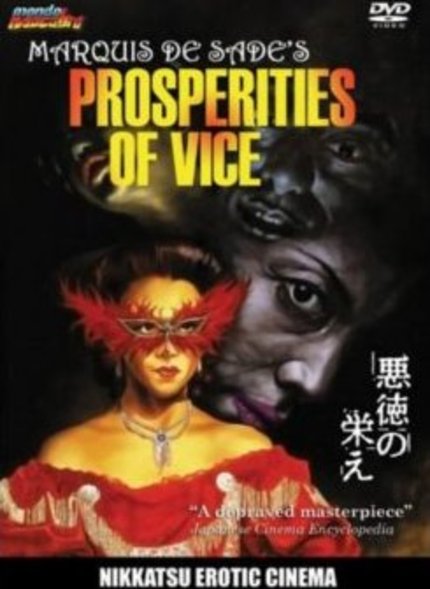DVD Review: Akio Jissoji's PROSPERITIES OF VICE

After Nikkatsu killed off roman poruno, the studio came back with a softer line of movies under the rubric of Ropponica. One of the early titles in the series was Akio Jissoji's Marquis De Sade's Prosperities of Vice, which was released in 1988. As is evident from Mondo Macabro's new English-subtitled DVD, Prosperities of Vice is a visually arresting film that maintains an artful edge while avoiding the rough bloodymindedness that characterized late-era roman poruno.
In the film, a decadent count in 1920s Japan becomes obsessed with the Marquis de Sade. He creates a theater to stage adaptations of de Sade's works, including Justine and Juliette, using ex-criminals as actors. The count lures one of the actors into a private fantasy involving his wife, which leads to real-life treachery that mirrors de Sade's fictional works.
The setting of Marquis De Sade's Prosperities of Vice essentially alternates between excerpts of the count's stage productions, and events taking place in the count's home. Akio Jissoji uses a combination of surrealistic lighting and active, angular camera work to extract as much as possible from what could have easily been a dry, stagy production. When combined with fast cutting, the film's abstract narrative sometimes becomes hard to follow, but the film is so visually rich that it doesn't really matter. One of the film's running themes is gluttony. Behind the scenes, the count and his colleagues are shown eating rich, and occasionally grotesque, meals while reminiscing about various deviant acts they have committed. In what is perhaps one of the great undiscovered food scenes in cinema, the count describes a recipe for a cooked olive. What initially seems to be a simple recipe is revealed to be an ultra-elaborate process, which Akio Jissoji shows step-by-step.
As with all titles in the Mondo Macabro's ongoing Nikkatsu series, the disc is packaged with notes, theatrical trailer, a video commentary by Jasper Sharp, and the Roman Porno episode of the Mondo Macabro television show. Those who enjoyed the more artful and clever Nikkatsu titles in this genre like Noboru Tanaka's Watcher in the Attic, which Akio Jissoji eventually re-made, should really appreciate Marquis De Sade's Prosperities of Vice.







